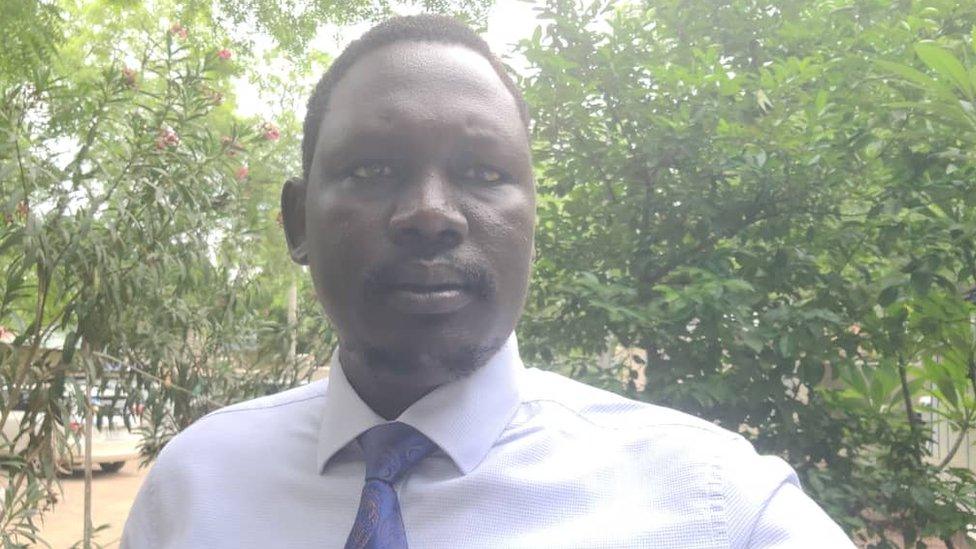Sudan crisis: Family stuck at Egypt border as drivers demand $40,000 to cross
- Published
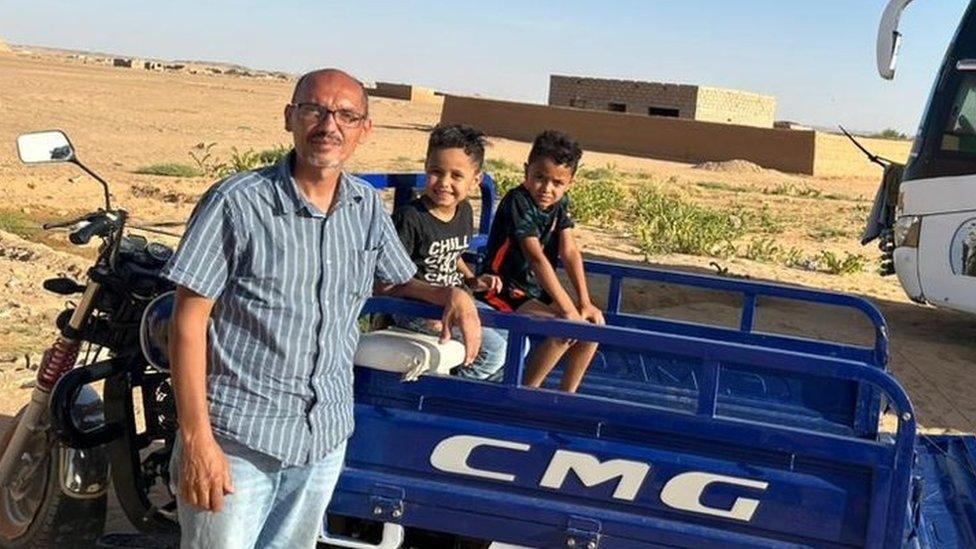
Fadi Atabani and two of his children
A family fleeing Sudan say they are among thousands stuck at the border with Egypt because drivers are demanding $40,000 (£31,810) to hire a bus to travel across.
Only people travelling on buses with special permits can cross the border. Crossing on foot is banned.
The family of seven, including three children under 10, escaped the fighting in the capital Khartoum two days ago.
Fadi Atabani said his family, including an 88-year-old woman, were trapped.
"There are thousands of people here. There is no accommodation. People are sleeping in schools or [on] mattresses," he said, speaking to the BBC from the border town of Wadi Halfa.
Most of the family have British nationality and Mr Atabani is appealing to the UK authorities for help.
"I cannot guarantee my children's medical health here we are in the middle of the desert. I want the British government to assist me in evacuating or a bus which can get us across the border," he said.
Mr Atabani accused local bus drivers of taking advantage of the desperate situation travellers found themselves in.
"On a normal day the cost of hiring a bus is $3,000. As of today people are paying $40,000 to charter a bus to the border - only 30km," he said.
"Who has that sort of money? The banks were closed, ATM machines are not working," the 53-year-old said.
Meanwhile, Khartoum resident Hosna, who declined to give her surname, told the BBC she had two daughters trapped in the Sudanese capital. She said they faced fares of over $400 each to travel to the border. Before the fighting broke out, the journey cost around $25.
Hosna arrived in the Egyptian city of Aswan before the conflict began. "My daughters saw an artillery shell fall in our neighbourhood. I could not bring them here. I don't have a husband or a son to help them. I work day in day out to save money," she said.
To try to make the money, she took a job serving in a tea shop at the same bus station that has become a hub for refugees near Aswan.
"Sudan is completely destroyed. They [fighters] are targeting people in their homes," Hosna said.
Esraa Bani, a Sudanese-American academic who has flown to Aswan to help people arriving, said the bus prices had increased "astronomically".
"They funded their own evacuation, they are stripped out of dignity. It is such a painfully disastrous situation," she told the BBC.
Clashes between the Sudanese army and paramilitary group the Rapid Support Forces (RSF) began on 15 April. Hundreds of people have since died and thousands have been injured in the conflict.
On Monday the two sides agreed a three-day ceasefire that was renewed on Thursday. Despite this clashes have continued in some areas.
The fighting is devastating the capital and its surrounds - which until recently had a population of around 10 million - leaving people without supplies of food, water and fuel.
Mr Atabani said he had left his home in Khartoum with just a few items of clothing.
"I left Khartoum with all my valuables in my house. Do I still have a house there? God knows at the end of this. We just grabbed what we could."
Relatives in the UK say repeated efforts to get help from the Foreign Office have led nowhere.
Officials have told them that British citizens can only be evacuated from the Wadi Seidna airfield near Khartoum, which is a perilous two-day bus journey away.
"It so difficult to get to that airfield," Mr Atabani told the BBC. "They say you go to the airfield at your own risk, why would I risk my family?"
On Thursday Turkey said an evacuation plane coming in to land at Wadi Seidna was fired at.
In a statement to the BBC, the Foreign Office said it had been "working intensively to evacuate British Nationals, since the outbreak of violence in Sudan, in a complex and highly volatile environment".
"British Nationals in Sudan are our utmost priority and we urge those who wish to leave the country to travel to the British Evacuation Centre as soon as possible. We are unable to arrange any help with travel to the airfield," the statement added.
The Foreign Office said that by Thursday evening 897 people had been flown out of Wadi Saeedna airfield.
However the BBC has spoken to a British Sudanese doctor who is being evacuated by the RAF in the eastern Red Sea city of Port Sudan. There are dozens of British Sudanese citizens who are waiting to be evacuated from Port Sudan, but until now there have been no evacuation flights.
Additional reporting by the BBC's Tom Bateman in Aswan, Egypt
Related topics
- Published24 April 2023

- Published27 April 2023
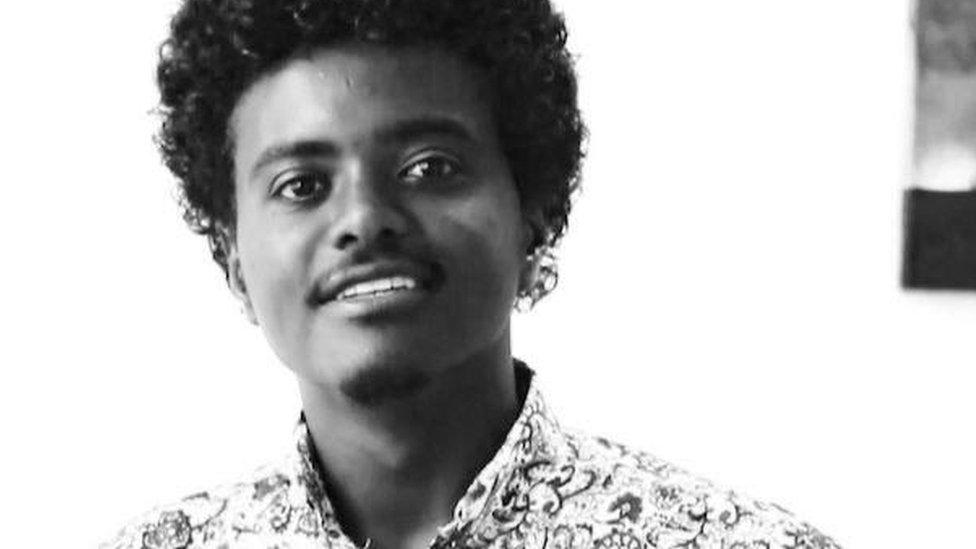
- Published27 April 2023
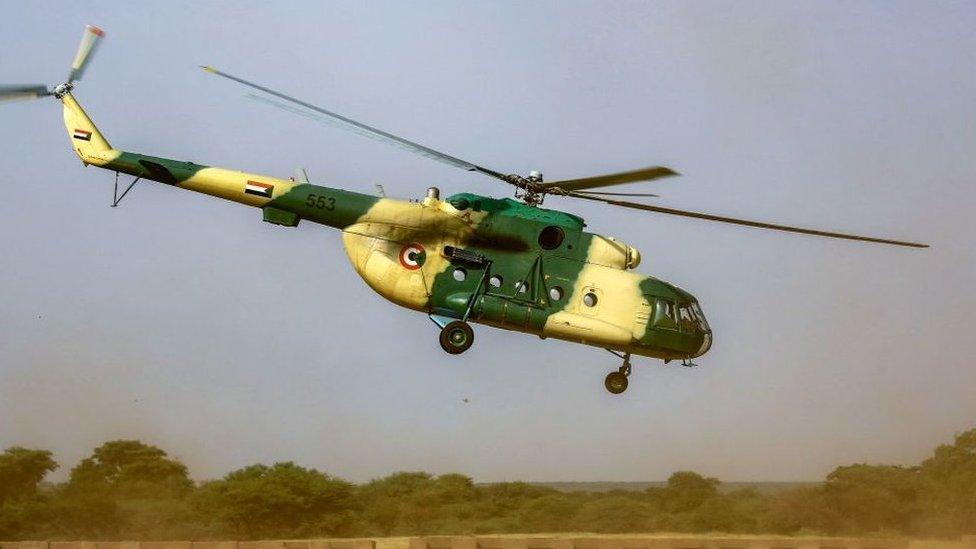
- Published17 April 2023
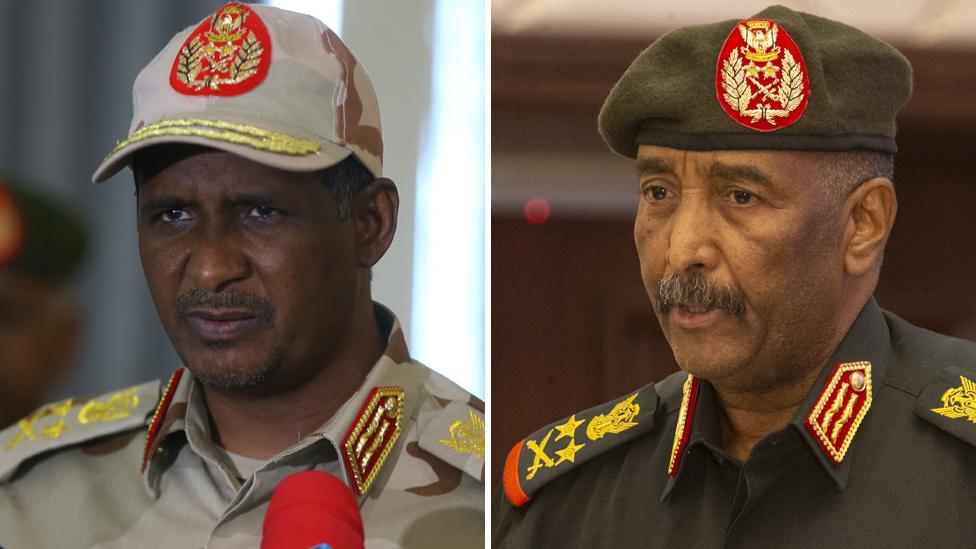
- Published27 April 2023
